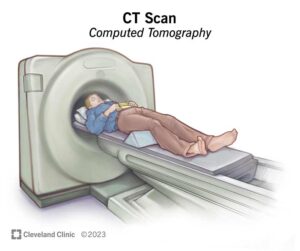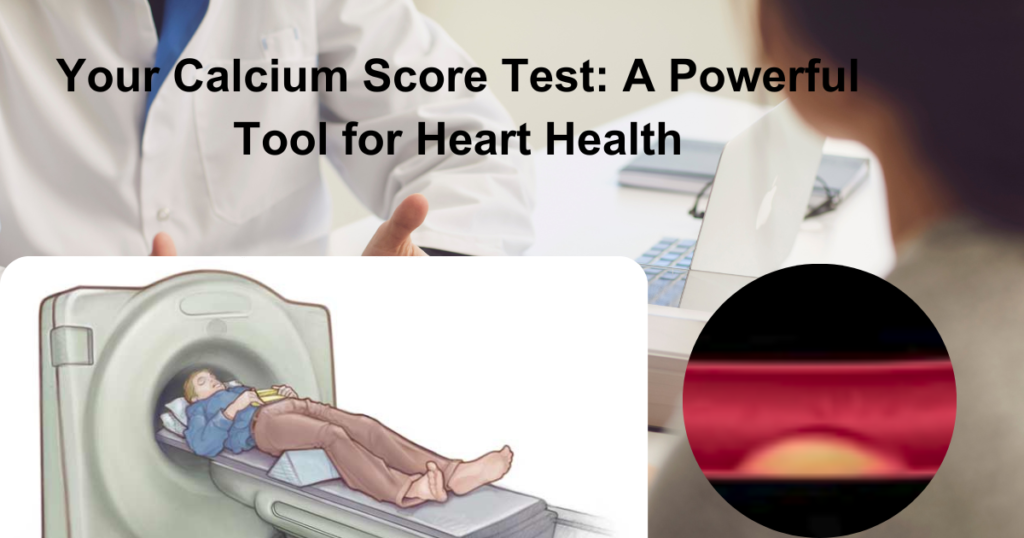Table of Contents
Introduction
Heart disease is the leading cause of death for both men and women in the United States. However, there are many things you can do to reduce your risk of heart disease, including getting regular checkups, eating a healthy diet, and exercising regularly.
One of the most important tests for assessing your risk of heart disease is the calcium score test. This test is a non-invasive way to measure the amount of calcium buildup in your coronary arteries. Calcium buildup is a sign of atherosclerosis, which is a condition that can lead to heart disease.
Calcium score test helps in knowing the extent of artery blockage. How to know if you are at risk of heart disease and stroke? Is there a simpler non-invasive method to know how much plaque has been deposited in arteries or to ensure that plaque has not been deposited in arteries? Yes, CT calcium score test is a non-invasive method, that measures the amount of calcium that’s present in arteries.
According to a study by the American Heart Association, A low coronary calcium score on a CT scan can significantly decrease your risk of heart attack or death.
This method gives a better idea about your risk of heart disease compared to traditional methods like blood serum cholesterol test, lp(a) test, homocysteine test, and CRP test. Angiography gives the best results but its drawback is that it is an invasive technique and is more expensive.
The calcium score test for the heart can be used to identify if you have coronary artery disease (CAD). This test is also used to assess whether you are in danger of acquiring this condition or whether it has already occurred so that it can be treated appropriately. The more calcium you have in your arteries, the higher your risk of heart disease and stroke.
What is CT Scan?

A CT (computed tomography) scan is a type of imaging test. Like an X-ray, it shows structures inside your body. But instead of creating a flat, 2D image, a CT scan takes dozens to hundreds of images of your body. To get these images, a CT machine takes X-ray pictures as it revolves around you.
Healthcare providers use CT scans to see things that regular X-rays can’t show. For example, body structures overlap on regular X-rays and many things aren’t visible. A CT shows the details of each of your organs for a clearer and more precise view.
What is a calcium score?
Calcium scoring is a test that uses computed tomography (CT) to measure the amount of calcium in your coronary arteries. The coronary arteries are the blood vessels that supply blood to your heart.
The test is painless and takes about 15 minutes. You will be asked to lie on a table while the CT scanner takes pictures of your heart. The pictures are then used to create a score that measures the amount of calcium in your coronary arteries.
The calcium score value indicates whether you have plaque buildup that might cause blockages or heart attacks. The calcium score test for the heart may be used to determine whether or not you have the risk of developing coronary artery disease (CAD).
How is calcium score measured?
The result of the test is usually given as a number called an Agatston score [ref: 1 ] . The score reflects the total area of calcium deposits and the density of the calcium.
The Agatston score is calculated by adding up the amount of calcium in each coronary artery segment. The total score is then used to determine your risk of heart disease and stroke.
A score of zero means no calcium is seen in the heart. It suggests a low chance of developing a heart attack in the future. [ref https://www.mayoclinic.org/tests-procedures/heart-scan/about/pac-20384686]
What does a calcium score mean?
The value of the calcium score indicates as follows:
1. A calcium score of 0 means that there is no calcium in your coronary arteries.
2. A score of 1-100 is considered low,
3. a score of 101-400 is considered moderate, and
4. a score of 401 or higher is considered high.
The higher your calcium score, the higher your risk of heart disease and stroke.
However, it is important to remember that a calcium score is just a risk factor. It does not mean that you will definitely develop heart disease or stroke.
What is the calcium score of clean arteries?
A calcium score of 0 indicates your arteries are clean. This is the condition of arteries when you are young.
As you age you may have atherosclerosis developed, but there are no symptoms of heart disease or stroke felt by you. This is because symptoms come very late.
Suppose, atherosclerosis or plaque buildup started at the age of 25. It is likely that you may feel the symptoms at the age of 50 and above. In any chronic disease, it takes very long time to diagnose the disease. Therefore, cancer, diabetes, and heart disease cannot be diagnosed early. Calcium score test will help you with early diagnoses o heart disease.
For example, your blood cholesterol test shows that your cholesterol levels are high or lipoprotein(a) levels are high. Even other markers like CRP and homocysteine may be high. It is an indication that plaque buildup in arteries has started. You are tending or moving towards a heart attack, heart disease, or stroke. If you consult the doctor will say you do not have heart disease, because you do not have symptoms of heart disease. A calcium score at this stage will be highly useful.
The doctor will prescribe you statins to lower cholesterol. But statins will not remove the blockages. After statin treatment, you may feel that- now my cholesterol levels are low and within the limit, so I am healthy. Remember, statin treatment has left the earlier deposit as it is in the arteries.
The ideal treatment is the one which will improve your arterial health and make your arteries clean. The calcium score of clean arteries is zero. This is possible with preventive measures. You can also reverse heart disease and bring calcium score to zero.
What should I do to maintain calcium score 0?
Yes, it is possible to maintain a calcium score of 0 by taking preventive treatment. This is possible by improving the health of the cells, or cellular health. This can be done by providing all the nutrients that are required to keep arteries healthy and clean. Products like lypro-c will help prevent and reverse high cholesterol, high lp(a) and atherosclerosis.
Traditional methods to take care of calcium score:
In traditional methods cholesterol lowering either with statins, cholesterol lowering stanols, food, diet is recommended. All these methods do not remove plaque from arteries nor repair damaged arteries. Hence we cannot expect to have a calcium score of 0 with these methods.
Risk factors
According to traditional method the risk factors for high calcium scores are the same as the risk factors for heart disease and stroke. These include:
• High cholesterol
• High blood pressure
• Smoking
• Diabetes
• Family history of heart disease or stroke
How can I lower my calcium score?
There are a number of things you can do to lower your calcium score and reduce your risk of heart disease and stroke. These include:
• Eating a healthy diet
• Exercising regularly
• Quitting smoking
• Managing your cholesterol and blood pressure
• Taking medications, if necessary
What happens if I have a high calcium score?
If you have a high calcium score, your doctor may recommend that you take steps to lower your risk of heart disease and stroke. These steps may include lifestyle changes, medications, or both.
Conclusion:
Calcium scoring is a valuable tool for assessing your risk of heart disease and stroke. If you have a high calcium score, it is important to talk to your doctor about ways to lower your risk. By taking steps to reduce your risk factors, you can help protect your heart health and live a long and healthy life.
References:
- Agatston AS, et al. Quantification of coronary artery calcium using ultrafast computed tomography. J Am Coll Cardiol. 1990;15(4):849-56.
- Budoff MJ, et al. Coronary artery calcium score for risk assessment in asymptomatic adults. Circulation. 2004;110(24):3429-36.
- Raggi P, et al. Coronary artery calcium score: a novel predictor of coronary events in individuals without known coronary artery disease. JAMA. 2000;283(23):2437-45.
- **Schiller NB, et al. ACCF/AHA 2013 guideline on the assessment of cardiovascular risk: a report of the American College of Cardiology Foundation/American Heart Association Task Force on Practice Guidelines. Circulation. 2013;128(16):1749
Suggested reading
Clean Arteries Indicate Normal LDL Levels: https://maintaincholesterol.com/blog/clean-arteries-indicate-normal-ldl-levels/
Urgent: Think Before You Start Lowering Cholesterol: https://maintaincholesterol.com/blog/start-lowering-cholesterol/
Lp(a): A Deadly Risk Factor for Progression of Coronary Artery Disease: https://maintaincholesterol.com/blog/progression-of-coronary-artery-disease/

